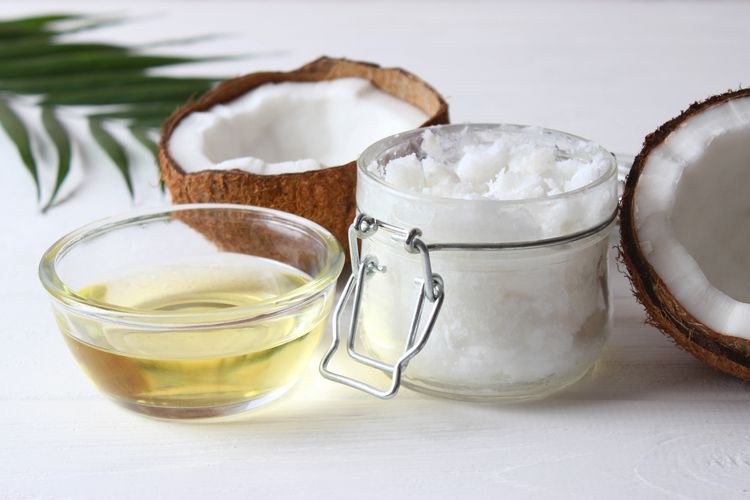
Coconut oil is a food ingredient that has grown in popularity as a kind of natural remedy and dietary supplement. People have claimed to experience a variety of health benefits when consuming coconut oil or applying it topically. It's not surprising that some dog owners have considered using coconut oil on their dogs for the health benefits it may provide.
Before embracing this dietary fad and using coconut oil on your dog, find out how safe it actually is and whether or not you can expect positive results.
Coconut oil is made by extracting the oils from coconuts. It can be used to prepare foods but can also be used as a dietary supplement. Coconut oil contains saturated fatty acids called medium-chain triglycerides. MCTs, like palm kernel oil and coconut oil, have different properties from long-chain triglycerides like olive oil, soybean oil, avocado oil, and fish oil. In theory, MCTs may be more easily digestible and a better source for quick energy than LCTs. MCTs may contain caprylic acid and capric acid, both of which have anti-fungal properties. They may also contain lauric acid, which has antibacterial, antiviral, and antifungal properties.
Any natural substance with supposed antibacterial, antifungal, and antiviral properties is likely to become popular with people looking for natural remedies. All of the hype makes coconut oil sound like a miracle food. However, it's essential for dog owners to understand that none of these claims are backed up by science. In truth, studies have been largely inconclusive regarding the purported benefits of coconut oil. Additionally, these studies have mainly been done on humans and not animals.
Some people believe that the MCTs found in coconut oil may aid in digestion, heal digestive disorders, and reduce inflammation. It is also possible that MCTs can help with brain energy and cognition in older dogs.
Some owners report that the topical use of coconut oil has improved skin conditions such as hot spots or itchy, dry skin. These owners used over-the-counter shampoos made with organic coconut oil and recipes for DIY paw balm to not only achieve these results, but to also help give their dog a shiny, glossy coat.
Other anecdotal evidence suggests that coconut oil may help with metabolic functions, aid in weight loss, and alleviate pain from arthritis as well as improving bone health.
Remember that anecdotes are not scientifically sound. Before you decide to add coconut oil to your dog's diet or apply it to the skin, be sure to consider potential risks as well. As always, your veterinarian is the best source of information regarding your dog's health. Do not begin using coconut oil on your dog before you consult your vet.
Despite the possible health benefits, coconut oil might not be healthy for your dog. Though not poisonous, it is a high-fat food that can cause complications in dogs with certain health conditions. In addition, dogs may gain weight on this fatty food, risking obesity and all the health issues that come along with it.
Before you follow advice from friends and random people who rave about the benefits of coconut oil, remember that their stories are not a substitute for scientific research that takes place in a controlled environment, among a large group of dogs, and is both repeatable and peer-reviewed.
As mentioned previously, consult your veterinarian before using coconut oil. Your vet knows your dog's medical history and physical condition, and can offer specific instructions and advice about how, if the vet deems it safe, to incorporate it into your dog's routine.
Topical use may be easily administered, but remember that your dog may lick it off the skin and ingest it anyway. Oral use should be done carefully, only giving your dog the amount recommended by your vet. Too much coconut oil can lead to vomiting, greasy diarrhea, weight gain, and other illnesses. In general, vets caution against increased fat in the diet for dogs with histories of pancreatitis and those prone to gaining weight. Other diseases and metabolic conditions can be exacerbated when using coconut oil.
If your vet gives you the go-ahead to use coconut oil topically or orally in your dog, be sure to get unrefined (also called "virgin") oil. Cold-pressed coconut oil is considered ideal.
Not all coconut oils taste the same. Some may have a stronger coconut flavor than others, so you may need to experiment with your dog to see what kind is preferred.

10 Obscure, Little-known Canine Facts in Honor of National Dog Day
With National Dog Day upon us, it's time to celebrate everything about our favorite pets—even the weirder stuff. Here are 10 obscure facts about dogs you probably didn't know.
Exploring the Different Types of Pet-Friendly Beaches
Are you looking for pet-friendly beaches? Learn about the different types of pet-friendly beaches, their locations, and tips for visiting them with your pet.
Toxic Chemicals & Household Items That Can Poison Dogs
There are many things in and around your home that can endanger your dog. Learn which chemicals and household items can poisin your dog.
Bronchitis in Dogs
Is your dog coughing and feeling unwell? It could be due to respiratory inflammation called bronchitis. Learn the causes, treatment, and prevention.
Choking in Dogs
A dog can occasionally swallow something incorrectly and start choking. Find out how you can tell if your dog is choking and what you can do about it.
Why Does My Dog Smell So Bad?
Does your dog smell? Find out what could be causing these unpleasant odors and if it's something that needs more than just a bath to fix.
Is Rosemary Safe for Dogs?
Rosemary is used both for cooking and as a supplement with many reported health benefits in people, so you may be wondering if it is safe to give to your dog. Rosemary is considered non-toxic for dogs but with some caveats.
Can Dogs Eat Blueberries?
Dogs can safely eat blueberries. Blueberries are packed with nutrients and can be a great addition to your dog's diet when fed in moderation. Learn more about the benefits, risks, how to incorporate blueberries into their diet, and other fruits dogs can eat.
Dog Food Basics
Are you feeding your dog the best way possible? Check out these dog feeding tips to keep your dog healthy and happy.
Swedish Vallhund: Dog Breed Characteristics & Care
The Swedish vallhund makes for a high-energy and affectionate companion. Learn about the breed's history, health, exercise needs, and more.
Becoming a Show Dog: Getting Started
Do you have the perfect puppy? Have you considered showing her in a dog show? There's much more to showing than showing up! Here's how to get started.
How to Care for a Hairless Cat
Hairless cats make great pets but they aren't without their own challenges and requirements. Read on to learn how to best care for your furless feline.
British Shorthair: Breed Profile, Characteristics & Care
The British Shorthair is a calm, affectionate cat that looks and feels like a plush teddy bear. Here's what you need to know about this popular breed, including appearance, temperament, health, and care.
Tonkinese: Cat Breed Profile, Characteristics & Care
The Tonkinese cat is a perfect mix of the Siamese and Burmese—smart, sociable, and sweet. Learn about the Tonkinese breed.
How to Stop Your Cat From Chewing Electrical Cords
Cats are known to pounce and attack inanimate objects, like electrical cords. Learn how to prevent your cat from ambushing objects that may harm it.
How to Stop Aggression in Kittens
Kittens may show aggressive behavior for several reasons. Sometimes their play gets too aggressive while other times the kitten is afraid or upset. Learn how to spot and curb aggression in kittens.
46 Egyptian Cat Names
Whether inspired by notable Egyptian deities, locales, or pharaohs, Egyptian cat names can bring out the divinity of your noble feline companion.
How to Tell If a Kitten is a Boy or a Girl
If you're wondering whether your new kitten is a boy or a girl, here are three ways to help determine the sex of your cat.
Signs Your Cat Is Aging and When to See the Vet
Expect some changes when your cat ages. Learn to differentiate between normal and potential medical problems for your elderly cat.
Coronavirus in Cats
Feline coronavirus (FCoV) rarely harms cats but can lead to another life-threatening illness. Learn the causes, treatment, and prevention.